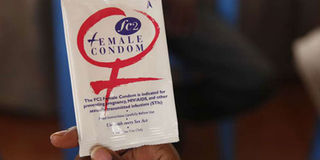New condoms-for-teens campaign has triggered many ethical questions

Contraceptives. Children should learn about sexuality. FILE PHOTO | NATION MEDIA GROUP
What you need to know:
- When a country’s fertility rate drops below replacement, that is, less than 2.1, that country is actually losing power.
- Uganda promoted SRA, especially abstinence and fidelity to reduce HIV infection rate from 15 per cent to 5 per cent
A recent article stating teenagers are already sexually active and all they want is to know where to get contraceptives and how to use them has sparked heated debate among proponents and opponents of child sex, and revealed some little-known facts about Comprehensive Sexuality Education (CSE).
The April 18 Daily Nation Page 1 splash: “We want condoms, say teens” unveiled a 2015 study by the Guttmacher Institute of New York and the Nairobi-based African Population and Health Research Centre (APHRC).
It targeted 15-17-year-olds in Homa Bay, Mombasa and Nairobi counties.
SEXUAL EDUCATION
Pioneering Primary Health matriarch and former National Aids Control Council Chairperson Miriam Were regards Sex Education for boys and girls as vital.
It has been shown to reduce involvement in sexual activities.
Nairobi obstetrician and gynaecologist and member of the Kenya Christian Professionals Forum Wahome Ngari concurs.
Children should learn about sexuality, but not just any model.
He advocates Sexual Risk Avoidance (SRA) education (abstinence) and not the Sexual Risk Reduction (SRR) condom-based education associated with CSE.
INFORMED CHOICES
In a recent Daily Nation opinion, Ms Estelle Sidze of the APHRC and Guttmacher’s Ms Melissa Stillman defended their study.
CSE, they said, helps students “make healthy, informed choices about their sexual and reproductive lives, including increased contraceptive use”.
They accused teachers of emphasising that “sex is dangerous or immoral for young people… Almost six in 10 teachers incorrectly tell students that condoms alone are not effective for pregnancy prevention”.
In an interview, Mr Richard Kakeeto, a lawyer and proponent of social justice and ethics at the Catholic University of Eastern Africa revealed a little known aspect of APHRC and Guttmacher.
He said that Guttmacher is the research arm of the International Planned Parenthood Federation (IPPF), whose local partner is APHRC.
IPPF, he said, is the largest abortion provider in the USA, and “has worked hard in sexualising children”.
SEXUAL EXPERIENCE
Mr Kakeeto and Dr Wahome raised ethical concerns about the APHRC-Guttmacher study and challenged the researchers to share the ethical approval and questionnaire they used to help them determine “if the study was ethical” to “avoid a repeat of the (Alfred) Kinsey debacle.
“It would also allow us repeat the same study in different parts of the country to correlate the study findings,” Dr Wahome said.
Alfred Kinsey, he said, conducted studies in which paedophiles sexually stimulated children.
“Though Kinsley was later proven to have been deranged, some human rights activists took up his research findings to promote recreational sex as a child right, laying the foundation for CSE, Dr Wahome said.
Any study involving under-18s is sensitive and written parental consent is a prerequisite for it, Dr Wahome says.
Any interview and/or sample collection should be performed in parents’ presence.
Where sensitive questions on sexual experience that may make the child uneasy might be asked, the best tool would be a self-administered questionnaire filled with the parents or guardian (in the investigator’s absence) to avoid coercion.
The questionnaire design is important to eliminate bias.
REPRODUCTIVE RIGHTS
Kenya, alongside 21 other Eastern and Southern Africa countries, signed a joint health and education ministerial commitment in 2013 to provide CSE in primary schools, the APHRC-Guttmacher article said.
Early this month, the Commission on Population and Development, sitting it New York, failed to approve a document titled: “Changing population age structures and sustainable development”, sponsored by the UN Population Fund.
The document was apparently rejected for being heavy on “reproductive rights”, which champions abortion and CSE.
Nations “were deeply divided on these issues”, a press release signed by Family Watch International President Sharon Slater said.
Mr Kakeeto draws linkages between population and power.
When a country’s fertility rate drops below replacement, that is, less than 2.1, that country is actually losing power.
HIV INFECTION
He noted: “Small population means lesser consumption, lesser consumption means limited economic growth.
"The possible response in the West could be encouraging their people to have children but this has failed to work so they choose to control population elsewhere...it is offered as indispensable aid...yet we actually do not need it.”
India and China are taking power away from the West by sheer might of their population, he noted.
CSE proponents, Dr Wahome said, use scare tactics against parents by claiming, more children will die of Aids if CSE is not introduced.
And yet, Uganda promoted SRA, especially abstinence and fidelity to reduce HIV infection rate from 15 per cent to 5 per cent, he says.



